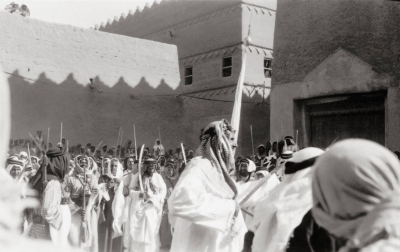
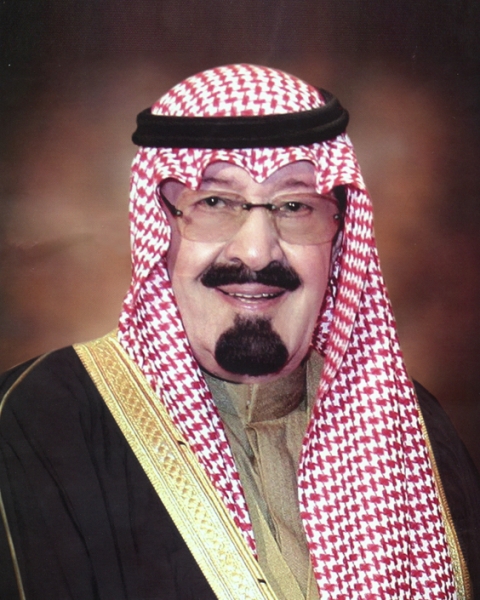
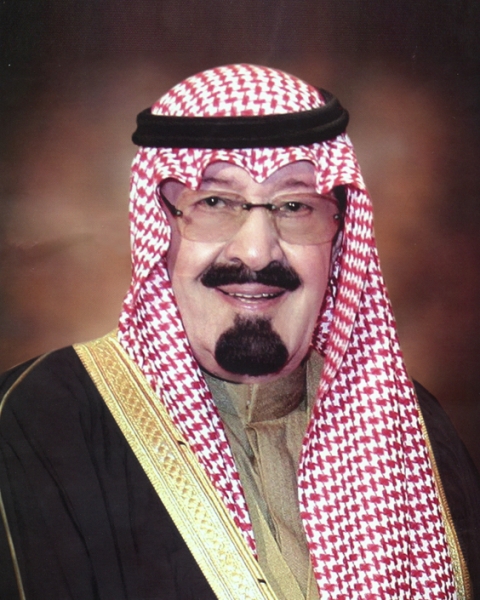
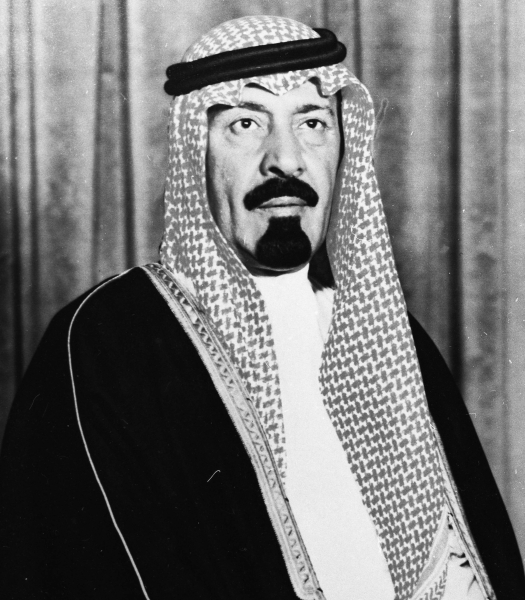
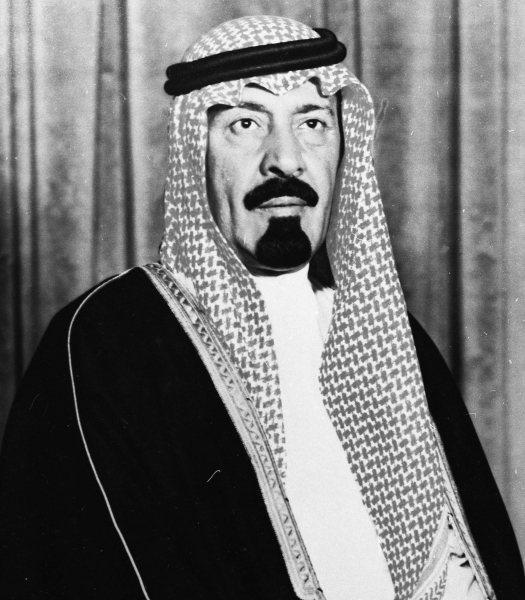
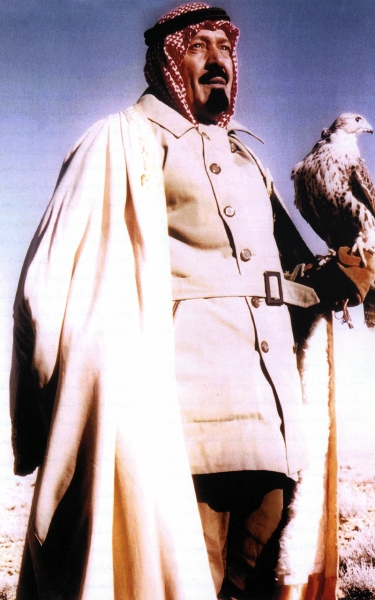
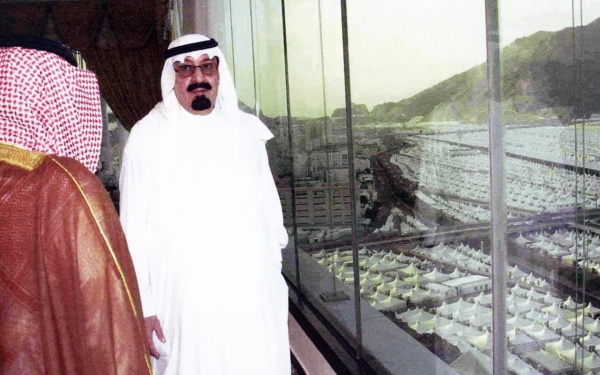
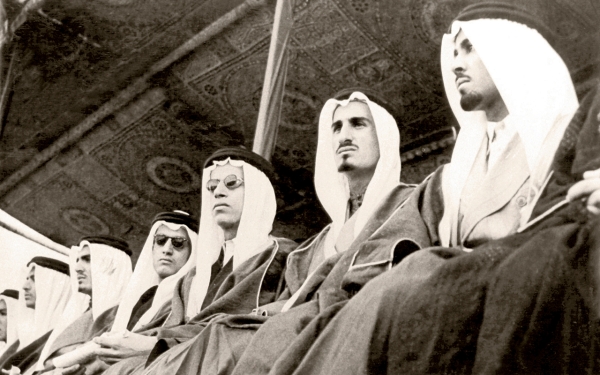
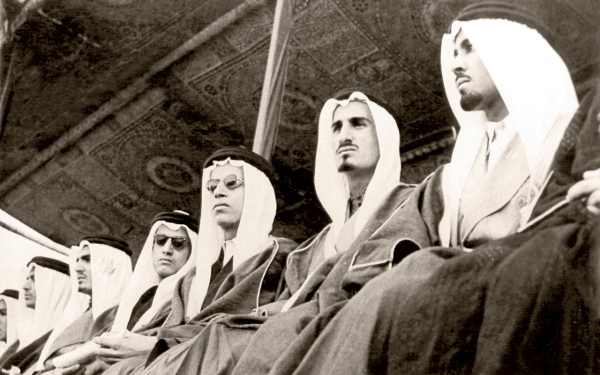
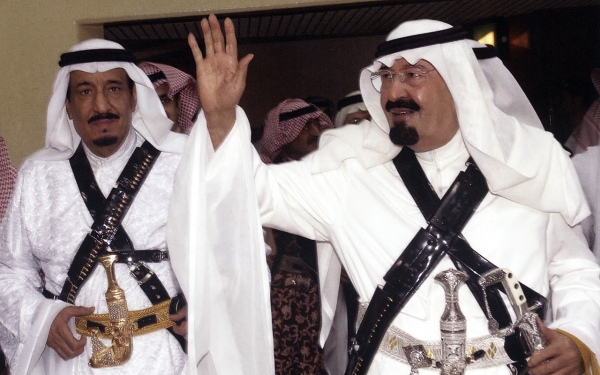
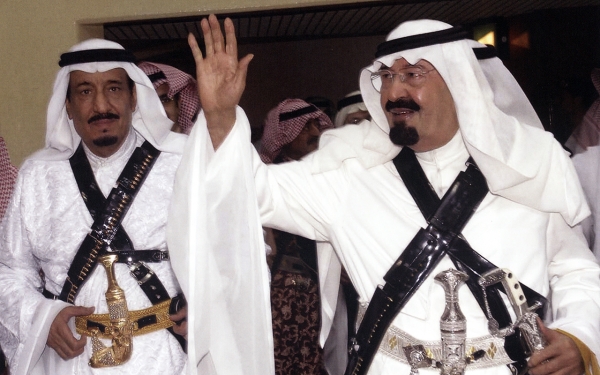
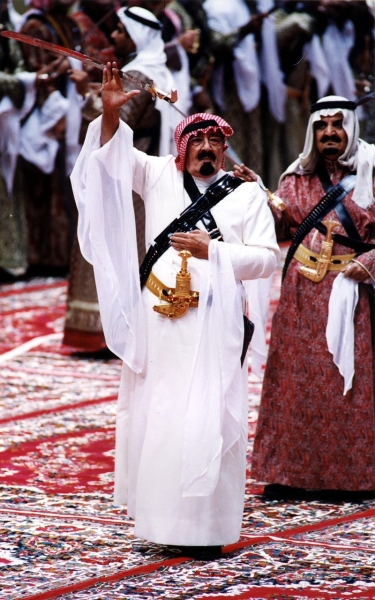
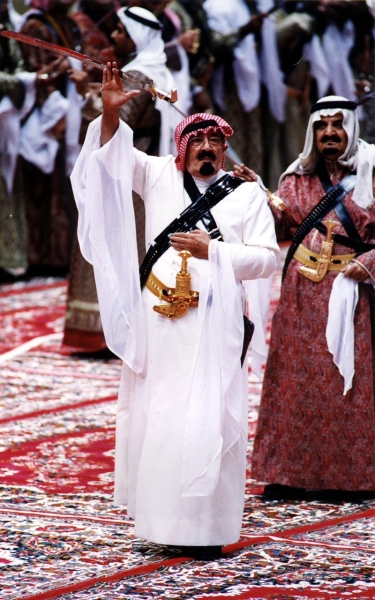
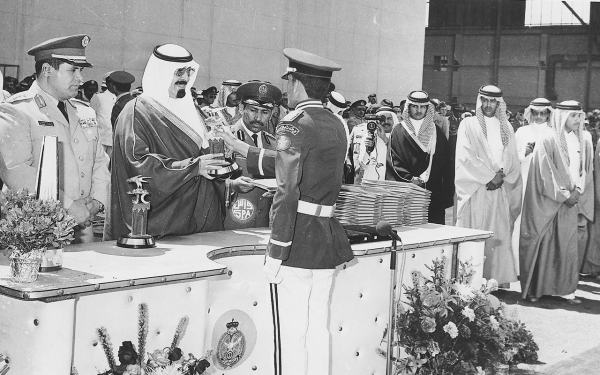
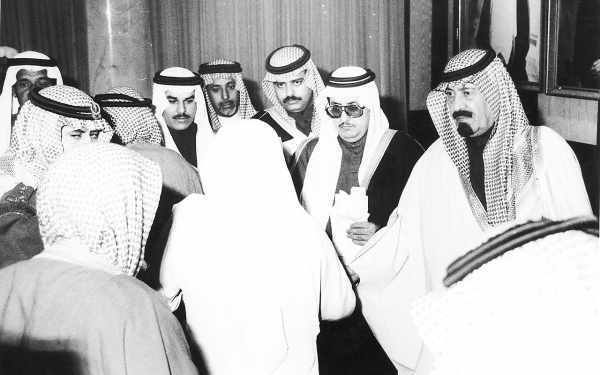
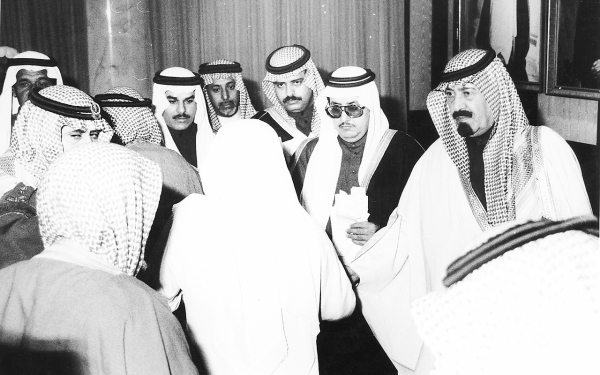
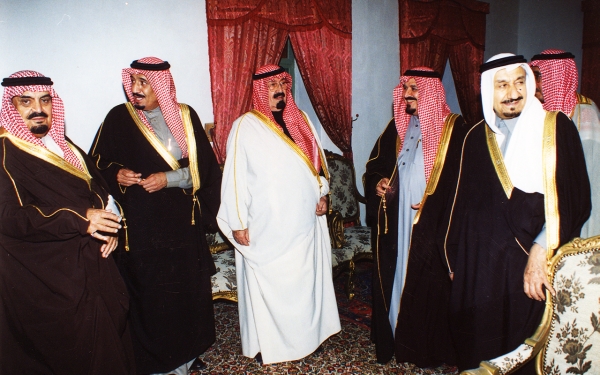
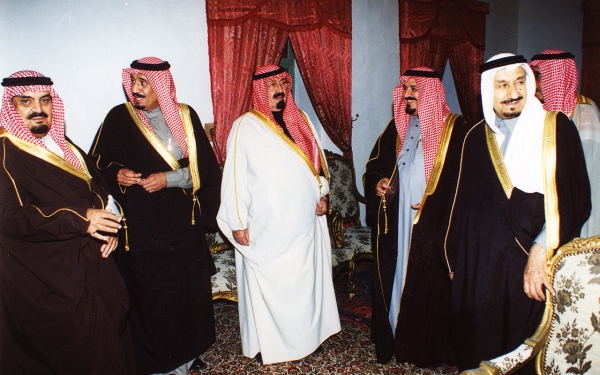
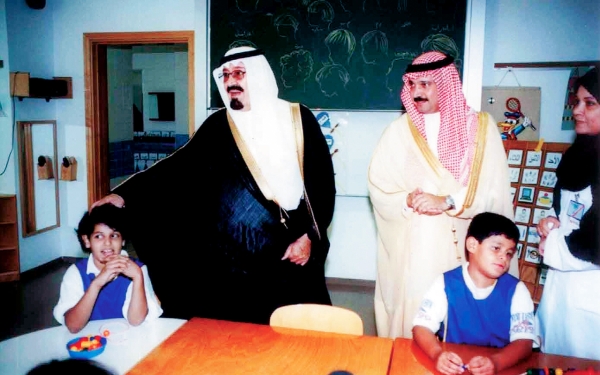
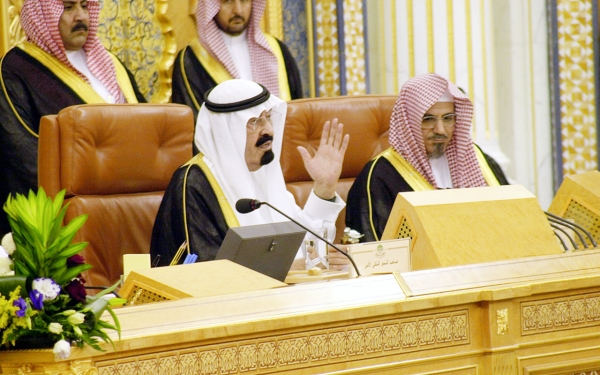
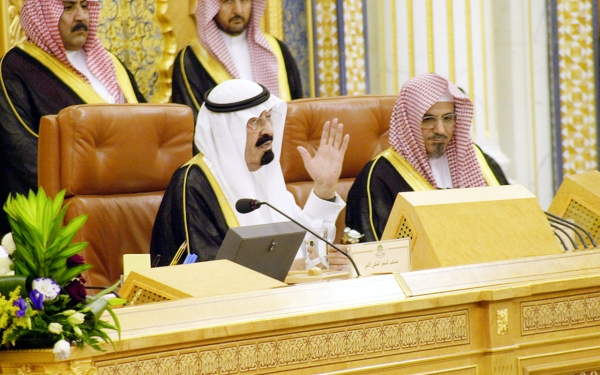
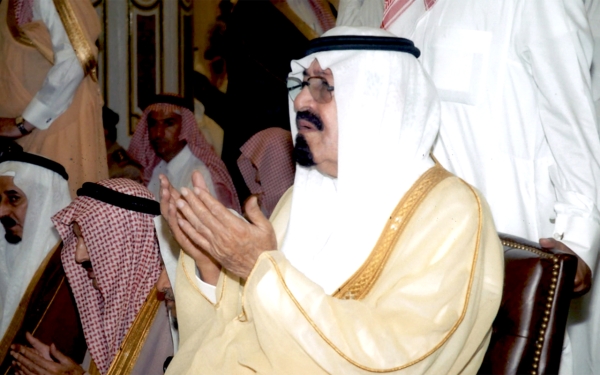
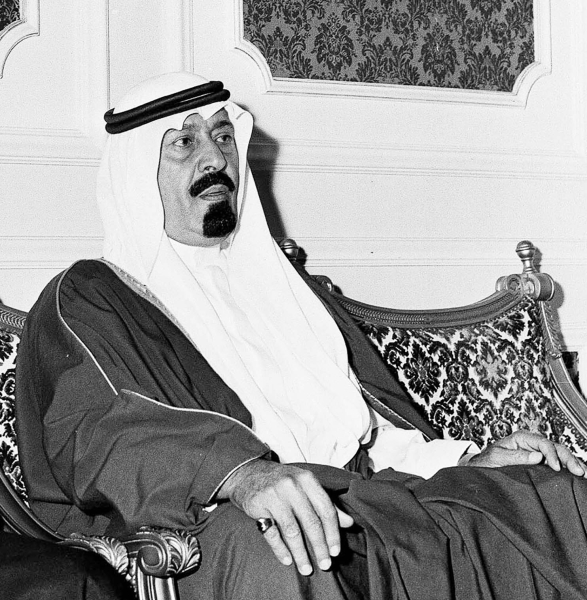
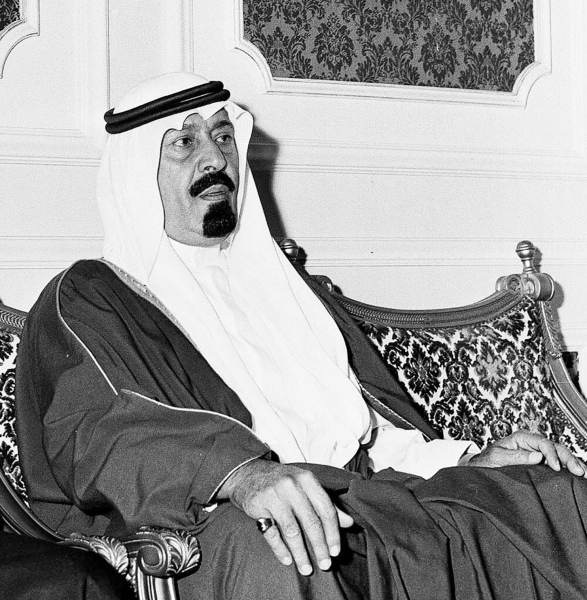
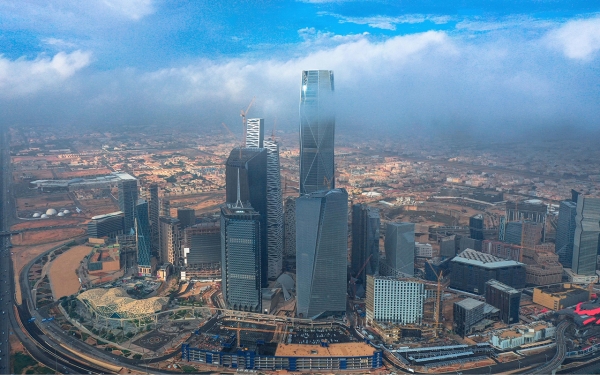
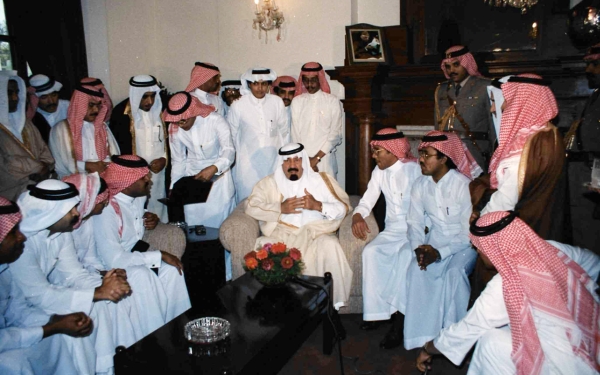
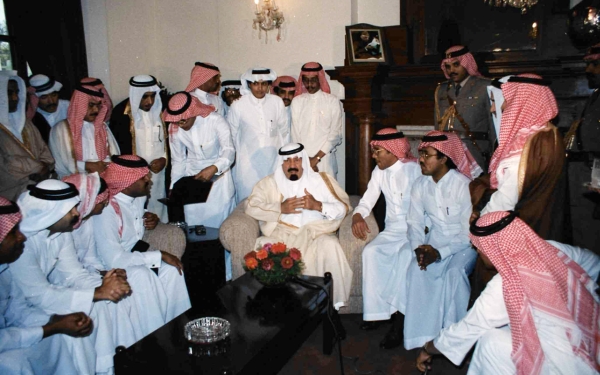
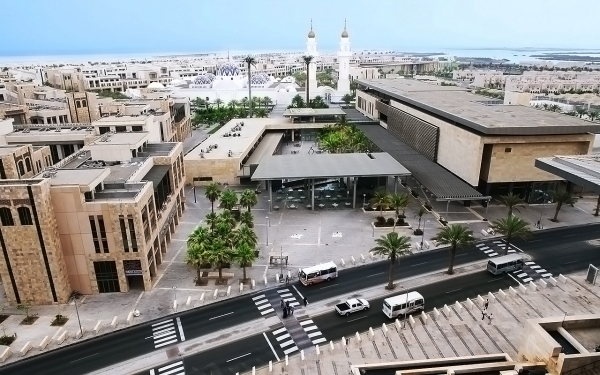
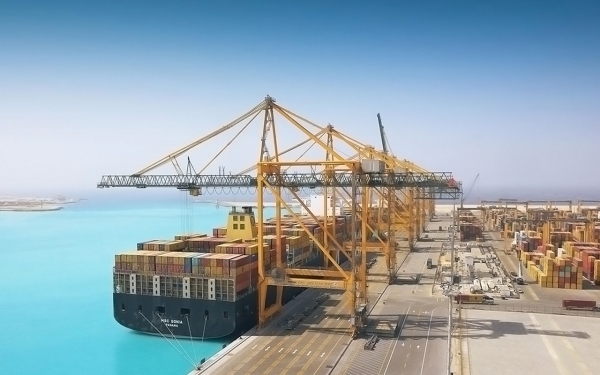
King Abdullah Bin Abdulaziz Al Saud (1924-2015) is the sixth king of the Kingdom of Saudi Arabia. He was pledged allegiance as King after the death of his brother King Fahd Bin Abdulaziz Al Saud in 2005, and he continued to rule for about ten years. He was succeeded by his Crown Prince, the Custodian of the Two Holy Mosques, King Salman Bin Abdulaziz Al Saud.
King Abdullah is considered the first Saudi ruler to have three prince brothers succeed as his crown princes, and they are: Sultan, Naif, and Salman, the sons of Founding King Abdulaziz Bin Abdulrahman Al Saud. He also has the longest tenure as crown prince, as he remained crown prince during the rule of King Fahd for twenty-four years.
King Abdullah Bin Abdulaziz
Birth and life of King Abdullah
He is Abdullah Bin Abdulaziz Bin Abdulrahman Bin Faisal Bin Turki Bin Abdullah Bin Mohammed Bin Saud Bin Mohammed Bin Muqrin Bin Markhan Bin Ibrahim Bin Musa Bin Rabi'ah Bin Mani' Bin Rabi'ah al-Muraydi from Banu Hanifah, from Bakr Bin Wail, from Rabi'ah Bin Nizar Bin Ma'ad Bin Adnan.
He is the tenth son of the Founding King Abdulaziz Bin Abdulrahman Al Saud. He was born in Riyadh City in 1924, the year his father entered Makkah al-Mukarramah. His mother was Princess Fahda Bint Asi al-Shuraim. She passed away when he was ten years old, and he was raised under the care of his father, the Founding King, who provided his sons with full attention and care.
Education and culture of King Abdullah
King Abdullah received his early education at al-Hukm Palace School in Riyadh, a school established by Founding King Abdulaziz to teach his sons. It had a group of religious scholars and professors. They learned the Holy Quran, Islamic studies, Arabic language and calligraphy, and mathematics. The Founding King personally supervised his sons’ education and academic progress. He guided the teachers to double their efforts in teaching them. He also encouraged them to read, memorize the Quran, and listen to their teachers of scholars and professors. It was King Abdulaziz’s custom to hold a grand ceremony whenever one of his sons completed memorizing the Holy Quran. King Abdullah’s ceremony was held in 1935 and lasted for three days.
King Abdullah gained social experience from his father, the Founding King, which he utilized in the fields of governance, politics, administration, and leadership. He accompanied several sheikhs and benefitted from them in education and guidance. He was also interested in interacting with scholars and intellectuals, both domestically and abroad. His cultural depth stemmed from self-education through extensive readings in various fields.
Personality traits of King Abdullah
King Abdullah Bin Abdulaziz was known for his love of justice and integrity, as reflected in numerous instances where he upheld fairness and equity. His qualities included chivalry, selflessness, forgiveness, and compassion toward those in need. He was also known for his humility, attentiveness to people's needs, and deep appreciation for knowledge and scholars. Additionally, he showed great interest in researchers, outstanding individuals, inventors, and scientific and academic institutions.
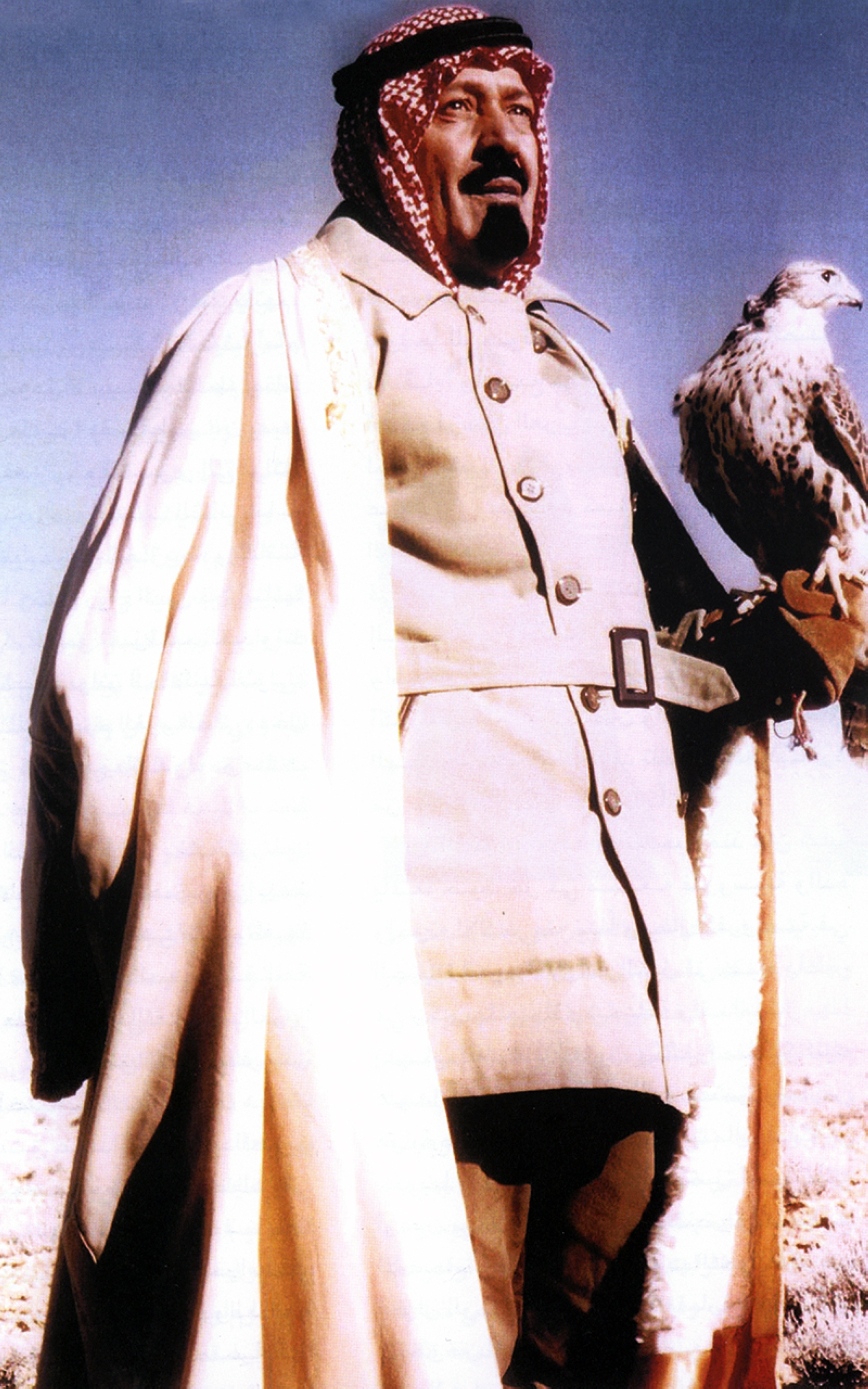
Hobbies of King Abdullah
King Abdullah's foremost hobby was falconry and hunting, a pastime in which he spent considerable time, often embarking on extended trips to remote areas both within and outside Saudi Arabia. His second passion was his deep love for the desert, which he frequently visited whenever he had free time. One of his favorite hobbies was equestrianism, a sport that reflected his dedication to preserving authentic Arab heritage. He personally collected and maintained purebred Arabian horses. To ensure the continuity of this tradition and preserve the authenticity of Arabian horses, he founded the Equestrian Club in Riyadh City and encouraged others to uphold this noble sport. Additionally, he had a strong passion for reading and intellectual exploration.
Official positions before his assuming the rule
Commander of the National Guard
Before ascending to the rule, King Abdullah held several high-ranking positions, including serving as the commander of the National Guard (now the Ministry of National Guard). King Saud Bin Abdulaziz Al Saud issued a Royal Decree on February 4, 1963, appointing King Abdullah (then a prince) as the commander of the National Guard. This branch of the Saudi Armed Forces was established during the reign of the Founding King Abdulaziz, and was composed of men who supported him during the unification and establishment of Saudi Arabia. Under King Abdullah’s leadership, the National Guard witnessed significant progress and development.
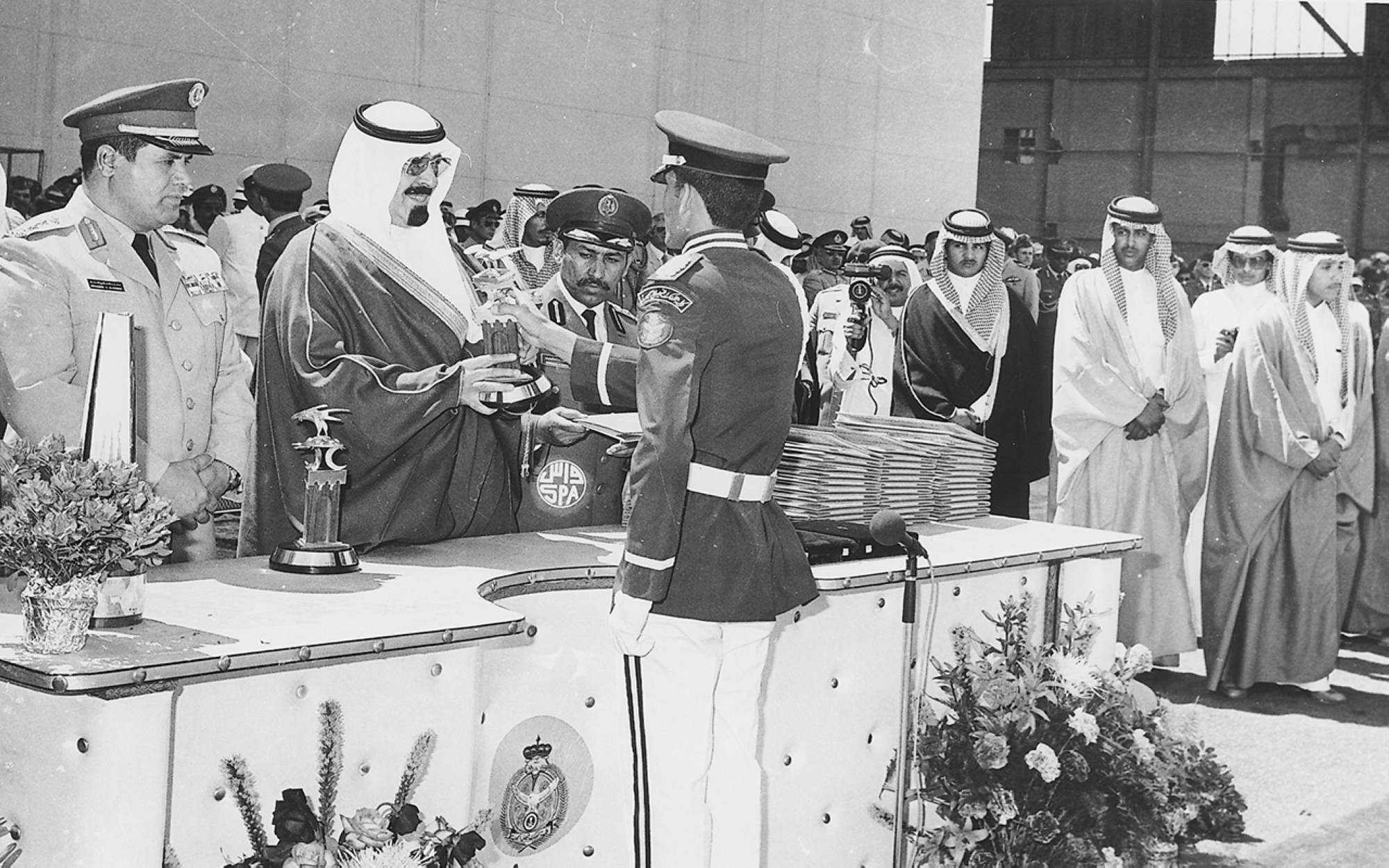
A new era for the National Guard
From the moment King Abdullah took command of the National Guard, he worked on its development, transforming it from a brigade-based structure into a fully integrated modern system. This led to the formation of a commando unit, which was later expanded into a comprehensive military body representing the General Staff of the National Guard. Additionally, a number of military personnel were sent abroad to complete their higher education at international institutions. The National Guard leadership also brought in experts to enhance its military and administrative systems, giving it a modern organizational structure. Furthermore, the guard was equipped with the latest weapons and suitable military equipment.
The National Guard's technical schools were later developed, and in 1980, an advanced military college was established under the name King Khalid Military College. It specializes in training and graduating National Guard officers, preparing them similarly to other Saudi military and security colleges.
In the medical sector, two medical cities were established in Riyadh and Jeddah, along with several high-capacity hospitals within them. These facilities were initially intended to serve National Guard personnel; however, they extended their services to Saudi citizens from across Saudi Arabia.
One of the significant medical achievements of the National Guard was the separation surgeries for conjoined twins, which were provided free of charge to both Saudi and non-Saudi patients from around the world. King Abdullah personally supported this initiative, which distinguished Saudi Arabia’s medical efforts in general and the National Guard’s healthcare services in particular.
Second Deputy Prime Minister
Apart from King Abdullah (then-Prince) assuming the command of the National Guard, King Khalid Bin Abdulaziz Al Saud designated him as the second deputy prime minister in 1975.
Crown prince era
On June 13, 1982, King Khalid passed away, and his brother King Fahd Bin Abdulaziz Al Saud was pledged allegiance as king of Saudi Arabia. At the same time, King Abdullah (then-Prince) was pledged allegiance as crown prince, while remaining commander of the National Guard. King Fahd issued a Royal Decree appointing him first deputy prime minister, and he remained crown prince for twenty-four years.
Assuming state affairs on behalf of King Fahd
The period during which King Abdullah Bin Abdulaziz served as Crown Prince is divided into two phases. The first phase lasted from his appointment to the position until 1995, spanning approximately thirteen years. The second phase extended from that year until 2005, lasting about ten years, during which King Abdullah was entrusted with managing the country's affairs due to the health conditions of King Fahd at the time. This delegation of authority was granted by King Fahd on January 2, 1996, in accordance with Saudi Arabia’s governance system, which stipulates that the Crown Prince assumes the administration of state affairs in the absence of the King. He assumed management of Saudi Arabia's daily affairs domestically, and represented Saudi Arabia on foreign visits, conferences, negotiations, and signing agreements with world leaders and officials. During this era, he upheld the same approach as his founding father and his brothers, the kings, in both domestic and foreign policies.
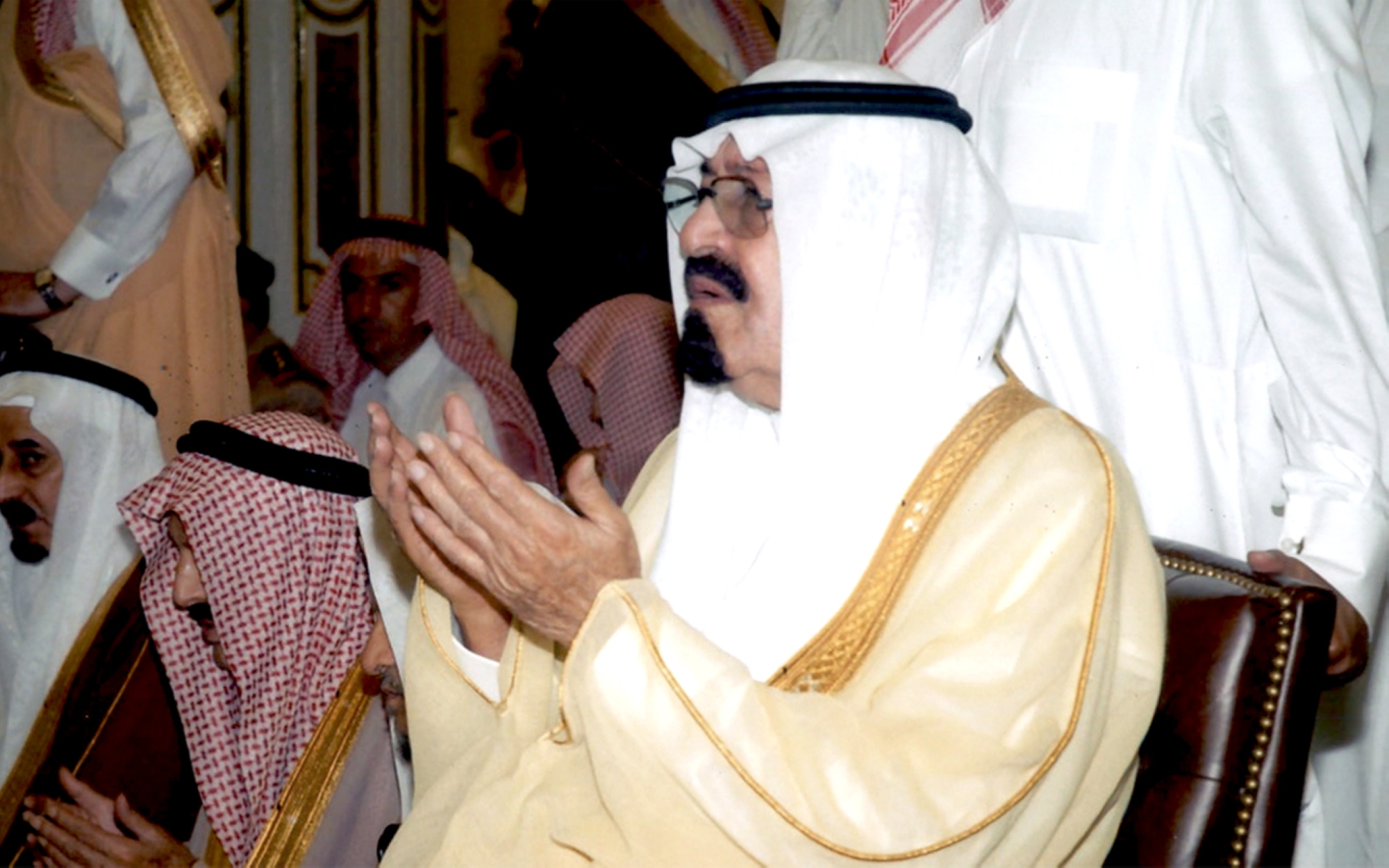
King Abdullah Bin Abdulaziz, king of Saudi Arabia
King Abdullah ascends the rule
King Abdullah Bin Abdulaziz was pledged allegiance as King of Saudi Arabia on August 2, 2005, after the death of his brother King Fahd Bin Abdulaziz. After assuming the rule, King Abdullah issued a Royal Decree appointing Prince Sultan Bin Abdulaziz as crown prince and deputy prime minister, in addition to his posts as Minister of Defense and Aviation and Inspector General. Six years later, on October 22, 2011, Prince Sultan passed away due to illness. King Abdullah chose Prince Naif Bin Abdulaziz, then-minister of interior, as crown prince, after consultation with the Chairman and Members of the Allegiance Council. Eight months after assuming the position, Prince Naif passed away. Consequently, on June 18, 2012, King Abdullah issued a resolution appointing Prince Salman (the current Custodian of the Two Holy Mosques King Salman Bin Abdulaziz) as crown prince, alongside assuming the Ministry of Defense, which he took over after the death of his brother Prince Sultan. On March 27, 2014, King Abdullah issued a Royal Order appointing Prince Muqrin Bin Abdulaziz as deputy crown prince, while remaining second deputy prime minister.
Stances in foreign policy
King Abdullah’s reign witnessed active political activity that influenced Saudi Arabia's foreign relations. These relations expanded, and through officials’ communications or local and foreign conferences, Saudi Arabia demonstrated its extensive influence internationally. Issues of critical importance in contemporary Arab and Islamic history were significant in that political and diplomatic activity, as were regional issues concerning Gulf Cooperation Council (GCC) countries, whether Arab or international.
King Abdullah was keen to support peaceful trends and establish the pillars of reform and security in Arab countries. Prioritizing GCC countries’ security continued Saudi Arabia’s approach in policy and stances toward Gulf security and safety. King Abdullah adhered to Saudi Arabia’s unwavering policy toward Gulf stability and independence.
Major administrative regulations
King Abdullah issued a Royal Order on October 19, 2006, regulating procedures for royal succession and appointing the crown prince in Saudi Arabia – the 'Allegiance Council Law.' This formed a council comprising: sons of Founding King Abdulaziz Bin Abdulrahman Al Saud, one son appointed by the King for each deceased, abstaining or incapacitated son of the Founding King, provided he is reputed for righteousness and competence, and two members appointed by the king, one of his sons and one son of the crown prince, both reputed for righteousness and competence. Upon the king's passing, the council calls for pledging allegiance to the crown prince as king of the country, according to this law and the Basic Law of Governance. After pledging allegiance and after consulting council members, the king chooses one, two, or three individuals deemed suitable for becoming crown prince. This selection is then submitted to the council, which collectively nominates one of the chosen candidates as the crown prince through consensus. In the event the council fails to nominate any of the candidates, it must nominate an individual whom it deems fit for the position of crown prince.
In 2011, King Abdullah issued a Royal Decree establishing the National Anti-Corruption Authority (currently the Oversight and Anti-Corruption Authority). It was placed under the direct organizational authority of the King and was tasked with overseeing government sectors. Its responsibilities included monitoring the implementation of public affairs-related directives and regulations, protecting integrity, and monitoring aspects of administrative and financial corruption.
Civilizational achievements during the era of King Abdullah Bin Abdulaziz
Service of the Two Holy Mosques
The Masaa Expansion Project was one of the projects undertaken at the Holy Mosque during the reign of King Abdullah. Work on the project began on February 9, 2007, and its completion achieved several objectives, including increasing the capacity of the Masaa, facilitating the movement of pilgrims within its facilities, ensuring their security and safety during movement, and providing designated pathways for people with disabilities and the elderly. The area of a single floor in the new Masaa is estimated at 18,000 m², while the total area reaches eighty-seven thousand m². Its capacity is approximately 118,000 people per hour, and the total built-up area, including all floors and supporting services, amounts to 125,000 m².
The Masaa expansion was followed by King Abdullah Bin Abdulaziz's project to expand the Grand Mosque and its northern courtyards, which began in September 2010. Its objective was the execution of a northward expansion known as al-Shamiya, with appropriate and adequate areas to serve the growing numbers of pilgrims as a long-term solution. The courtyards were expanded circularly in all directions to align with the Qibla direction and worshipers’ movements, securing additional main, secondary, and subsidiary entrances distributed along the expansion facades proportionately for the expected numbers of worshipers. Prayer halls were built inside the expansion buildings, accommodating about three hundred thousand worshipers, and outdoor ones for about 314,000 worshipers, raising the total capacity to over six hundred thousand worshipers.
King Abdullah Bin Abdulaziz's reign also witnessed a project aimed at increasing the capacity of the circumambulation area (Mataf). The project commenced on November 15, 2012, to elevate the Mataf and its connected areas' capacity, upon completion, from the previous forty-eight thousand circumambulation performers per hour to approximately 105,000 per hour.
King Abdullah’s interest in the Two Holy Mosques also manifested in the King Abdulaziz Endowment for the Two Holy Mosques project, which he ordered to be built according to Islamic architectural style. It consists of seven towers with a total area of 1.5 million m and a capacity for about sixty-five thousand people.
At the Prophet’s Mosque, during his visit to al-Madinah al-Munawwarah on September 24, 2012, King Abdullah Bin Abdulaziz launched an expansion project of the Prophet’s Mosque to accommodate about 2.8 million worshipers, with accompanying services. The project was implemented in three phases; the first phase accommodated eight hundred thousand worshipers, and the second and third phases expanded the eastern and western courtyards of the mosque to accommodate another eight hundred thousand worshipers. This historic expansion has a total built area of about one million m, with the addition of a main gate for the new expansion flanked by two minarets and four side minarets at the corners of the expansion and courtyards, able to accommodate over 1.6 million worshipers.
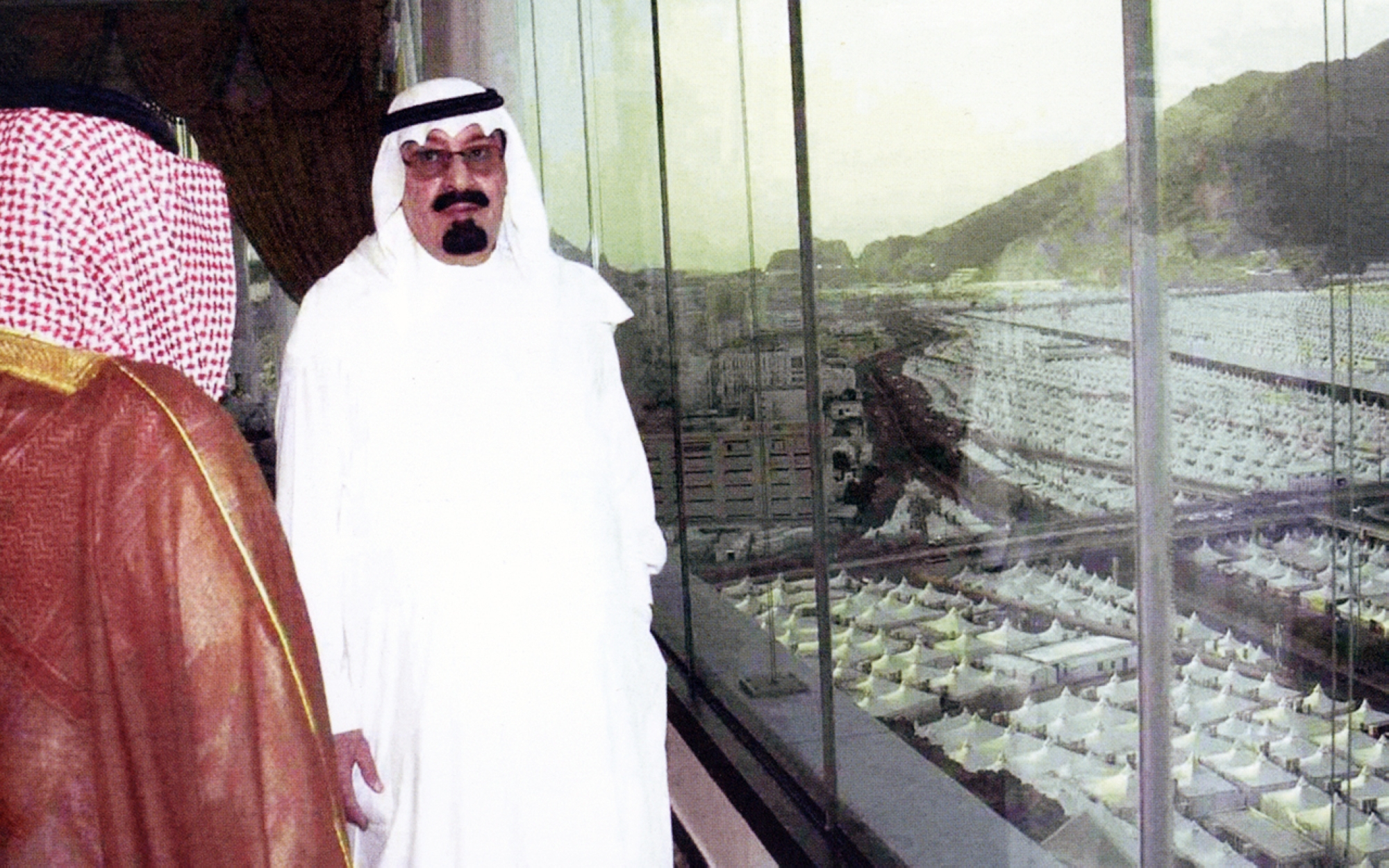
Holy sites development
King Abdullah's patronage extended to include projects and services offered at the Holy Sites, most importantly the Jamarat Bridge in 2006, which now comprises four floors and a ground level. Each of the bridge's floors accommodates an estimated maximum of 125,000 pilgrims per hour at peak times, with the bridge's total capacity exceeding five hundred thousand pilgrims per hour. The bridge's design allows adding further floors if needed in coming years and its foundations were established to bear twelve floors.
'Al-Mashaaer al-Mugaddassah Metro Line' was also launched, linking Makkah al-Mukarramah with the holy sites of
Al-Mashaaer al-Mugaddassah Metro Line Project won several awards, including the Franz Edelman Award in the USA for achievement in operations research. It was selected by the International Federation of Consulting Engineers among the best twenty-four global projects over the past one hundred years.
In 2010, the King Abdullah Bin Abdulaziz Zamzam Water Project was inaugurated to ensure the comfort of pilgrims and provide them with Zamzam water bottles.
Social services
King Abdullah sought swift solutions for unemployment in Saudi society by supporting the Saudi Credit and Savings Bank (now the Social Development Bank) and empowering it to meet demands for social loans, and finance and sponsor small and emerging enterprises. To achieve these objectives, the bank’s capital was raised by SAR20 billion. The SAR10 billion deposit he placed with the bank was added to its capital, bringing the total capital increase to SAR30 billion.
King Abdullah directed the unconditional exemption of all deceased individuals from paying bank installments pertaining to social purposes. Additionally, he granted a two-year installment exemption for all bank borrowers for social purposes. To ensure sufficiency for social insurance beneficiaries, he ordered raising the maximum number of individuals of the same family covered by social insurance from eight to fifteen members and allocated SAR1 billion for this purpose. He also activated and supported social security support programs.
Recognizing the importance of providing housing for citizens, King Abdullah directed the support of the Public Housing Authority’s budget, later the Ministry of Housing, with SAR15 billion. He stabilized the cost-of-living allowance within the basic salary for citizens at 15 percent and adopted a minimum wage for all Saudi workers in the country at SAR3,000 monthly. He also raised financial benefits for employees, such as secondment, transportation, and end-of-service indemnity, and ordered the fixture of all male and female citizens appointed for all positions funded by the state budget. He approved allocating job seekers in public and private sectors the sum of SAR2,000 monthly and established sixty thousand new military positions at the Ministry of Interior.
The health sector
The healthcare sector in Saudi Arabia developed significantly during the reign of King Abdullah, with an expansion of healthcare services. This commitment was emphasized by his statement: "When it comes to people's health, nothing is too expensive." During his reign, the Saudi Health Law was enacted, leading to the establishment of the Council of Health Services and the implementation of the Cooperative Health Insurance Law. These initiatives aimed to provide high-quality healthcare services to both citizens and residents in Saudi Arabia, ensuring their absolute right to receive treatment at any healthcare facility within Saudi Arabia without restrictions or conditions.
In the context of major medical facilities, King Abdullah, while serving as Crown Prince, issued an order in 2004 to commence operations at King Fahd Medical City in Riyadh. Additionally, several specialized hospitals were established and inaugurated, including King Fahd Specialist Hospital in Dammam, King Fahd Specialist Hospital in Qassim, and Hail Specialist Hospital, among others. Approximately SAR10 billion was allocated for these advanced healthcare facilities.
At the level of medical and applied research in health sciences, King Abdullah directed the establishment of a specialized global center for medical research bearing his name, to serve as an international reference for applied medical research in health sciences. It houses experts and specialized medical teams from around the world.
In the context of medical facilities, King Abdullah adopted a project to establish two thousand advanced health centers in the provinces and governorates of Saudi Arabia, to provide healthcare to citizens and residents alike, at a cost exceeding SAR5 billion.
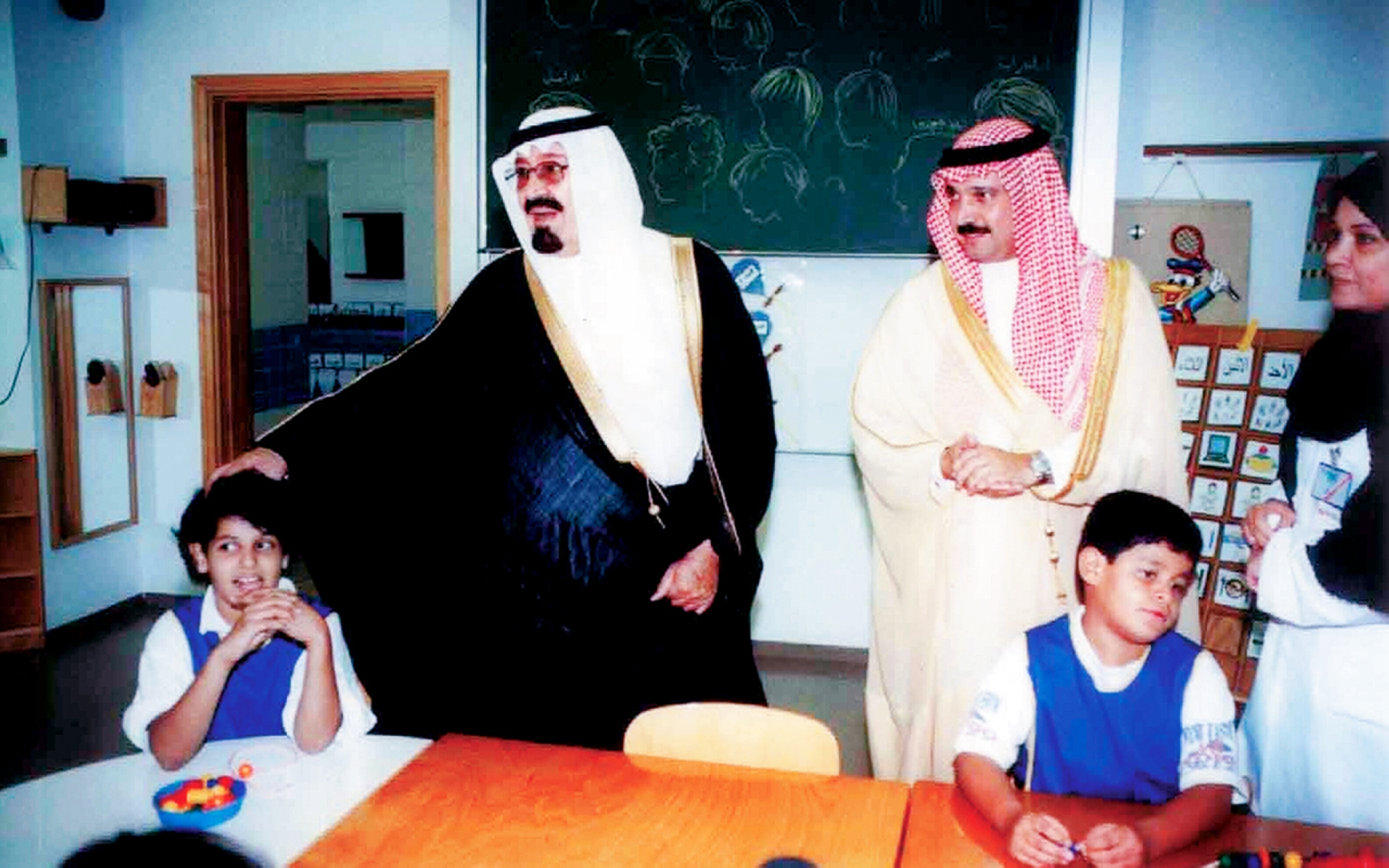
Educational advancement
King Abdullah was keen to invest in humans and to train them to a high degree that would enable them to achieve developmental feats for future generations. Many educational achievements and initiatives that he adopted and supported emerged, including the 'King Abdullah Project for Public Education Development' with a budget exceeding SAR9 billion over six years. King Abdullah also approved licensing a government company specializing in developing education, owned by the Public Investment Fund, to be the executive arm of the project. He also approved the project to develop mathematics and natural science curricula for all educational stages. He also adopted the project of incorporating English language courses into the elementary division curricula and developing English language curricula in the intermediate and secondary divisions.
King Abdullah showed special concern for higher education, prioritizing it since he was the crown prince. In 2003, the number of Saudi universities did not exceed eight government universities. Within less than seven years, this number quadrupled to reach twenty-five universities, in addition to an electronic university approved in 2010. He also approved the establishment of three universities in Hafr al-Batin, Rafha, and North Jeddah upon the request of the Higher Education Council. He encouraged the establishment of private universities and witnessed the beginning of studies at several private universities and specialized colleges, such as Prince Mohammad Bin Fahd University in al-Khobar and Alfaisal University in the capital Riyadh. At the academic level, some universities achieved success reflected in their rankings in the annual lists published by internationally recognized institutions. King Saud University and King Fahd University of Petroleum and Minerals secured advanced positions among the world's top universities.
King Abdullah University of Science and Technology (KAUST) is considered one of the significant civilizational achievements during the reign of King Abdullah in the field of higher education in Saudi Arabia. The idea, follow-up, and execution of the university came directly from the King. The university is dedicated to advancing scientific experiences, targeting the progress of knowledge and technology through bold and collaborative research. It targets scientific and technological leaders, aiming to educate and equip them with the latest experimental developments in modern science. Additionally, KAUST seeks to stimulate the Saudi national economy and address challenges of regional and global importance.
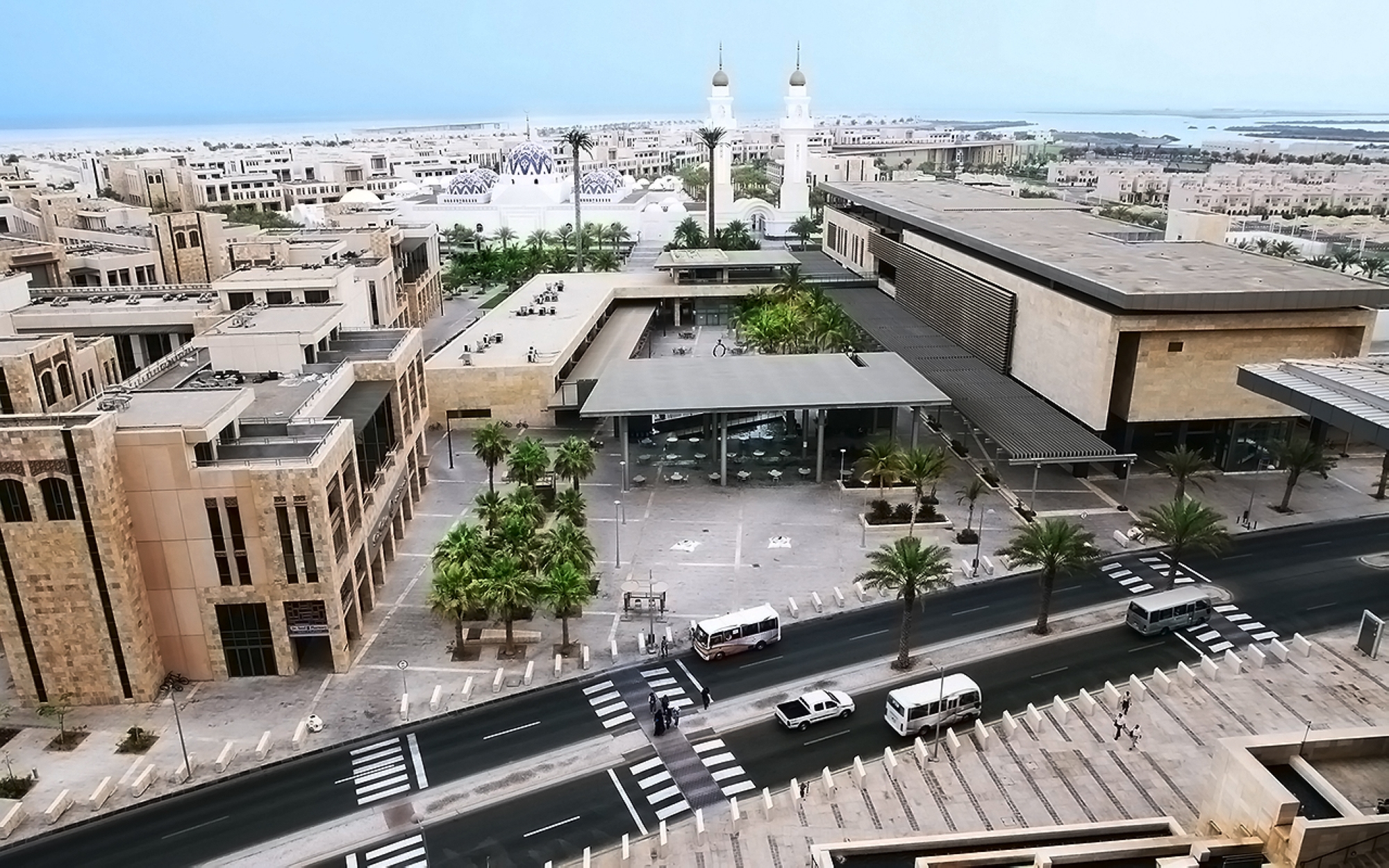
King Abdullah Bin Abdulaziz led a unique education program, known as the King Abdullah Scholarship Program, which was launched in 2005. During that period, approximately one hundred thousand male and female students received scholarships to pursue their studies at top international universities in various countries around the world. It caters to various higher education stages including bachelor’s, master's, doctorate, and medical fellowship. The program identified the required specializations and the number of sponsored students following the needs of both the government and private sectors in Saudi Arabia. The state allocated over SAR7 billion for international scholarship, and controls were established to ensure the students' commitment to their designated fields of study. Additionally, King Abdullah ordered a 50 percent increase in the stipends for scholarship recipients. Furthermore, he approved the inclusion of more than seven thousand male and female students who were self-funded in foreign universities into the program, allowing their studies to be funded by the state, similar to their peers.
Cultural development
The civilizational achievements during the reign of King Abdullah included the advancement of the cultural landscape in Saudi Arabia. In 2003, a Royal Decree was issued to merge cultural activities into the Ministry of Media, establishing the 'Ministry of Culture and Media.' The ministry worked on regulating and developing the cultural life in Saudi Arabia. Within the organizational framework of the ministry, two agencies were formed, one specializing in local cultural affairs and the other in international cultural matters. As a result, one of the largest exhibitions of Arab books, the 'Riyadh International Book Fair,' was held in Riyadh City. It has evolved into one of the largest Arab cultural gatherings, both in terms of the participating publishing houses and the accompanying seminars. The cultural support extended to awards for translation, heritage, and culture in general. It also included the backing of the King Abdulaziz Public Library, the King Fahd National Library, the 'Arabic Union Catalog' project, and other initiatives that contributed to enriching culture within Saudi Arabia and abroad.
Transport and logistic services
As part of King Abdullah's commitment to serving the Two Holy Mosques and pilgrims throughout the year, and to developing the transportation sector between cities and regions in Saudi Arabia, the 'Haramain High-Speed Railway' project was launched during his reign. This railway connects the cities of Makkah al-Mukarramah and al-Madinah al-Munawwarah, passing through Jeddah City and the King Abdullah Economic City. This qualitative leap in transportation was part of more comprehensive projects aimed at developing passenger and cargo movement throughout all Saudi Arabia's regions. In 2013, the 'King Abdulaziz Public Transport Project' known as the 'Riyadh Metro,' was added to this project.
Human rights
The government of King Abdullah worked to support every effort to protect human rights, employing all measures to affirm that protection through the judicial system, organizations, and authorities that support individuals' access to their rights, all of which bolstered the judicial and security systems. This included the establishment of two different but interconnected institutions working to support human rights. The first institution is a civil institution called the 'National Society for Human Rights,' and the second is an official commission, the 'Human Rights Commission.' The National Society for Human Rights was established on March 19, 2004, while the 'Human Rights Commission' was established a year and a half later.
Saudi women empowerment
During the reign of King Abdullah, numerous decisions and laws were issued to enhance the presence of Saudi women in serving society. This included granting them many facilities for managing their affairs and gaining independence.
As part of King Abdullah's commitment to the education and culture of Saudi women, one of the early decisions he made upon assuming the rule was the establishment of Princess Nourah bint Abdulrahman University (a university for females). The university project is considered one of the largest university projects in the Middle East, covering an estimated area of eight million m.
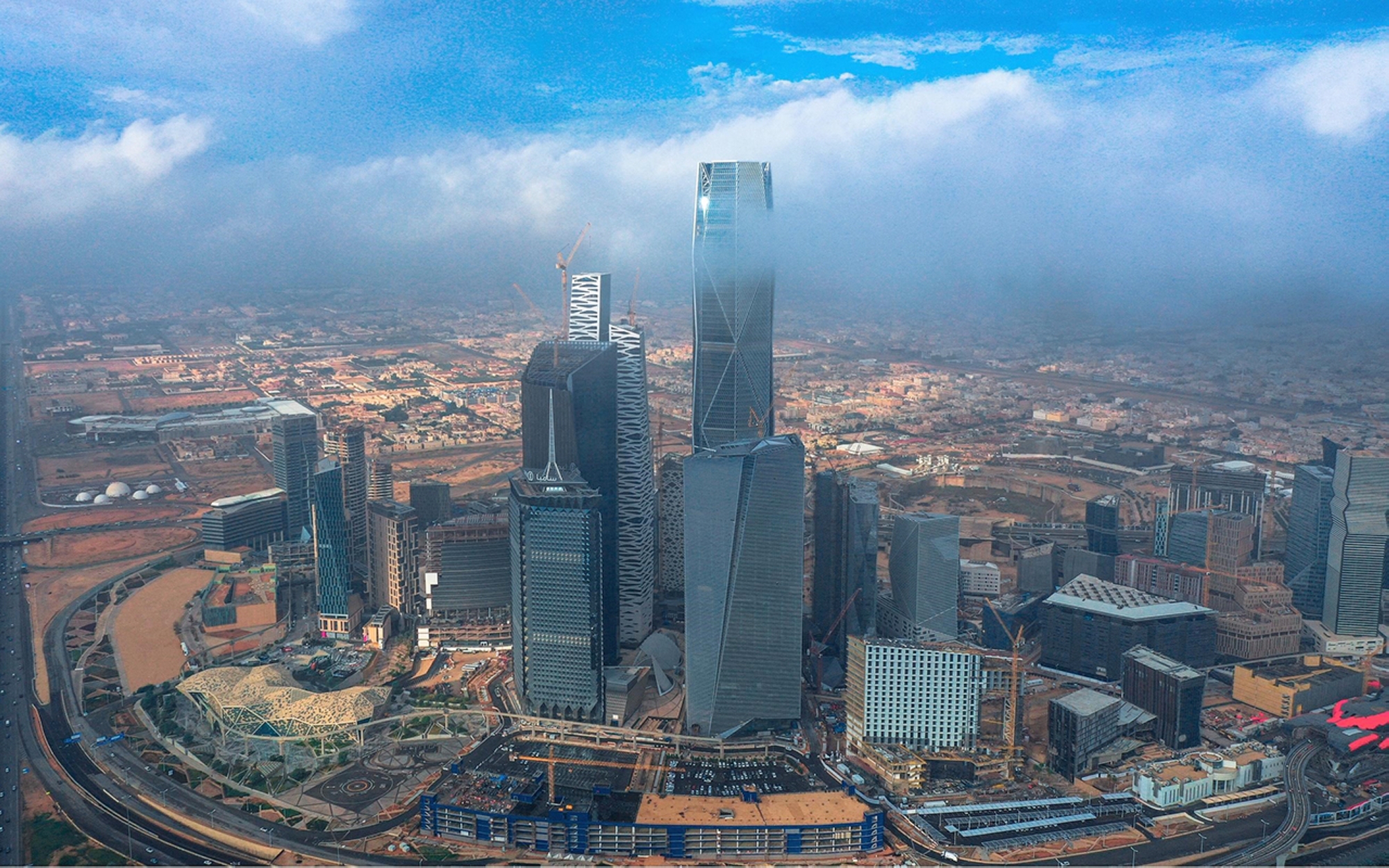
Economic development during the reign of King Abdullah Bin Abdulaziz
The Supreme Economic Council
The establishment of the Supreme Economic Council in 1999 was a significant step in the development of the Saudi national economy. King Abdullah led this council since its inception when he was the crown prince. At that time, the Supreme Economic Council was responsible for issuing major economic decisions, drawing up effective economic strategies, studying the annual state budget, ensuring the achievement of economic security, and other major economic tasks. King Abdullah continued to head the council even after assuming the rule. However, in 2015, the council was dissolved along with twelve other councils and high committees, leading to the establishment of the Council of Economic and Development Affairs.
King Abdullah Financial District (KAFD)
The King Abdullah Financial Center project was initiated in mid-2007. Its total cost amounted to about SAR30 billion, covering an area of 1.6 million m. It aims to amplify the contribution of the financial sector to advancing the national economy using its full available potential. The project also aims to provide multiple job opportunities for national talents by creating thousands of jobs.
Economic cities
King Abdullah's initiative to establish economic cities in Saudi Arabia was an important step in economic development. The economic cities included: King Abdullah Economic City on the Red Sea coast, Prince Abdulaziz Bin Mousaed Economic City in Hail City, located in the northern part of Saudi Arabia, Economic Knowledge City in al-Madinah al-Munawwarah, situated in the western part of Saudi Arabia, and Jazan Economic City in the southwestern part of Saudi Arabia.
Joining the World Trade Organization
After twelve years of negotiations, Saudi Arabia's accession agreement to the World Trade Organization (WTO) was signed on November 11, 2005, as a full member. This aimed to stimulate the national economic activity, increase growth rates, and boost demand for goods and services.
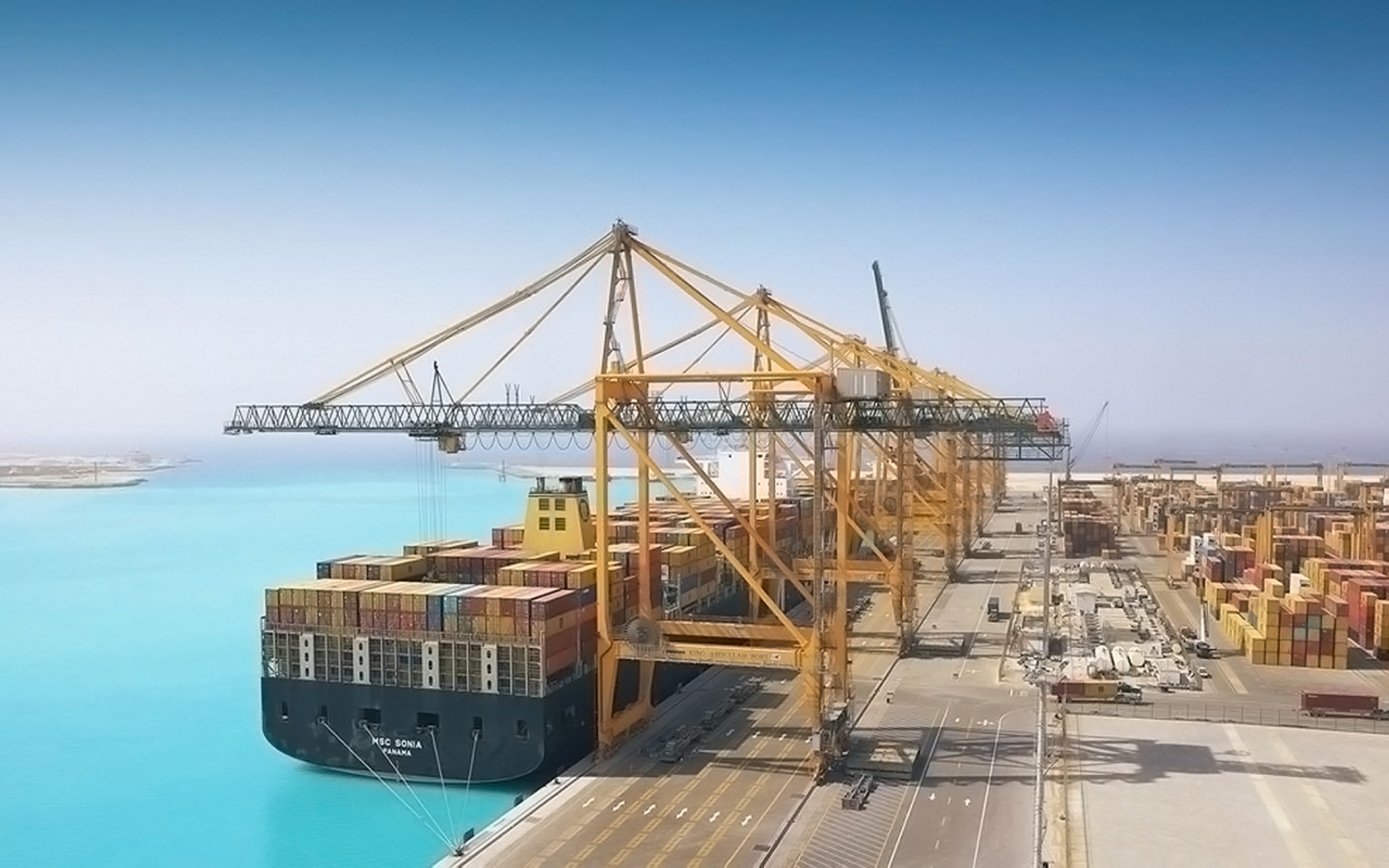
The comprehensive industrial strategy
On February 2, 2009, the Council of Ministers' resolution was issued to approve the National Industrial Strategy and its implementation mechanisms, in support of the national industrial sector. The decision took into account occurring global changes and responded to the requirements of Saudi Arabia's economy in maximizing the value added to the energy and petrochemical industries. The main objectives for developing the industrial sector focused on various aspects, including strengthening the industrial base, enhancing technical and productive efficiencies, improving competitive capabilities, developing infrastructure, expanding private sector participation, and supporting small and medium enterprises.
National strategy for social development
When he was Crown Prince, King Abdullah visited several impoverished neighborhoods in Riyadh on November 20, 2002. The visit carried humanitarian significance and marked the first step toward adopting a strategic plan to combat and eradicate poverty in Saudi Arabia. In the same year, the Council of Ministers approved that strategy, which was later modified to become the 'National Strategy for Social Development.' It stipulated the provision of opportunities for the poor to enhance their financial capabilities by providing education and suitable employment, ensuring appropriate healthcare services, supporting their products and achievements, increasing social protection, helping them cope with and face disasters, expanding the social insurance coverage for them, and providing financial and in-kind assistance at all times and under any circumstances.
King Abdullah also approved a humanitarian project known as the 'Poverty Alleviation Fund,' in which the state contributed a portion of its capital. The private sector and individuals were invited to support and contribute to the fund to achieve social solidarity. The fund aimed to provide suitable job opportunities for the poor and offer them soft loans to establish small projects that align with their circumstances and ensure a dignified life. King Abdullah issued orders to increase the maximum allocations for social insurance for eligible families from SAR16,200 to SAR28,000 per year. Additionally, SAR8 billion was allocated for housing for the poor in Saudi Arabia. He also announced the establishment of the 'King Abdullah Bin Abdulaziz Foundation for Development Housing Dedicated to His Parents' to secure homes for the neediest segments of Saudi society.
King Abdullah Bin Abdulaziz's key initiatives
National dialogue initiative
King Abdullah strengthened the dialogue approach to achieve understanding and coexistence in Saudi society. When he was crown prince, he ordered the establishment of the King Abdulaziz Center for National Dialogue in 2003, headquartered in Riyadh. This national initiative encouraged the holding of dialogues, discussion forums, youth programs, and opinion polls targeting members of the community. Among the key subjects it embraced were national unity, denouncing extremism and bigotry, advocating moderation, and developing education and training programs.
Intercultural and interreligious dialogue initiative
King Abdullah's intercultural and interreligious dialogue initiative was launched at a time when the world was looking towards international efforts to address the dangers threatening the stability of human societies. This was due to the evolving phenomena of hatred, racism, and animosity, and the worsening disruptions in international relations. The initiative represented the Islamic world's vision for dialogue, addressing issues that were increasingly raised on the international stage. The idea of the initiative progressed through three stages and comprised three conferences: the first was the World Islamic Conference for Interfaith Dialogue, held in Makkah al-Mukarramah in June 2008. The second was the World Conference on Dialogue, held in Madrid in July 2008. The third was the high-level Interfaith, Cultures, and Civilizations meeting held at the United Nations headquarters in New York in November 2008. These stages concluded with deliberations to find a practical formula for implementing the initiative.
The establishment of the King Abdullah Bin Abdulaziz International Centre for Interreligious and Intercultural Dialogue (KAICIID Dialogue Center) in October 2011 came to express the intended international determination to benefit from the initiative and to be a means of generalizing the real dialogue on all levels for those belonging to different cultures and human civilizations. To emphasize the implementation of this initiative on a wider international scale, "King Abdullah Bin Abdulaziz International Award for Cultural Dialogue" was announced, and "Abdullah Bin Abdulaziz International Program for a Culture of Dialogue and Peace" was established at UNESCO.
King Abdullah Humanitarian Foundation
The King Abdullah Humanitarian Foundation was established by Royal Order from King Abdullah Bin Abdulaziz on September 8, 2010. It aimed to embody the humanitarian objectives and contributions that he undertook locally and globally. This initiative reflects his continued commitment to perpetuating benevolence and giving through endowment projects across various domains, overseen by the foundation, during his lifetime and beyond.
Death of King Abdullah Bin Abdulaziz
King Abdullah Bin Abdulaziz Al Saud passed away at 1:00 AM on Friday, January 23, 2015. He was buried in al-Oud Cemetery in Riyadh. Following his passing, his crown prince, the Custodian of the Two Holy Mosques King Salman Bin Abdulaziz Al Saud assumed the rule.
Entities named after King Abdullah Bin Abdulaziz
- King Abdullah City for Atomic and Renewable Energy.
- King Abdullah Economic City (KAEC).
- King Abdullah Financial District (KAFD).
- King Abdullah Petroleum Studies and Research Center (KAPSARC).
- King Abdullah International Medical Research Center (KAIMRC).
- King Abdullah Bin Abdulaziz International Center for Dialogue between Followers of Religions and Cultures (KAICIID).
- King Abdullah Sport City Stadium in Jeddah.
- King Abdullah Sport City in Qassim.
- King Abdullah University for Science and Technology (KAUST).
- King Abdullah Humanitarian Foundation (KAHF).
- King Abdullah Bin Abdulaziz Foundation for Development Housing Dedicated to His Parents.
Orders and honors of King Abdullah Bin Abdulaziz
- Order of King Abdulaziz.
- King Faisal Bin Abdulaziz Order.
- Grand Decoration of Honor in Gold for Services to the Republic of Austria.
- Order of the Liberator General San Martin (Argentina).
- Order of the Southern Cross (Brazil).
- Order of Merit of the Italian Republic (First Class).
- Order of Merit of the Italian Republic (Knight Grade).
- Order of Friendship (Kazakhstan).
- Nishan-e-Pakistan (Pakistan).
- Order of the Smile (Poland).
- Order of the White Eagle (Poland).
- Honorary Knight Grand Cross of the Order of the Bath (United Kingdom).
- Royal Victorian Chain (United Kingdom).
- Order of the Golden Fleece (Spain).
- Order of Good Hope (South Africa).
- Order of the State of the Republic of Türkiye.
- Honorary Doctorate in Islamic Development and the First Royal Award for Excellence in Promoting Islamic Unity, from the International Islamic University Malaysia, 2006
- Honorary Doctorate from Jamia Millia Islamia University, New Delhi, 2006.
- Prince Naif Bin Abdulaziz Al Saud International Prize for the Prophetic Sunnah and Contemporary Islamic Studies for Serving the Prophetic Sunnah, 2006
- King Faisal International Prize for Service to Islam, 2008
- Honorary Doctorate from King Saud University, 2008.
- Lech Wałęsa Prize (Poland) for Promoting Interfaith and Civilizational Dialogue, 2008.
- Champion in the Battle Against Hunger Award, 2008.
- Arab Federation for Libraries and Information Appreciation Award, 2009.
- Honorary Doctorate in Science and Medical Education from Arabian Gulf University, Bahrain, 2010.
- King Khalid Bin Abdulaziz Award for National Achievement (First Edition), 2009
- Named by Forbes magazine among the most influential figures in the world, 2009.
- Safa al-Qudwa al-Hasanah Award for Transparency, 2011.
- Honorary Doctorate from al-Azhar, 2014.
- Honorary Doctorate in Politics and International Relations from the International Islamic University, Islamabad, 2014.
- Honorary Doctorate in 'International Relations and Achieving Principles of Security and Peace' from Imam Mohammed Bin Saud Islamic University, 2014.
Related quizzes
Related articles

